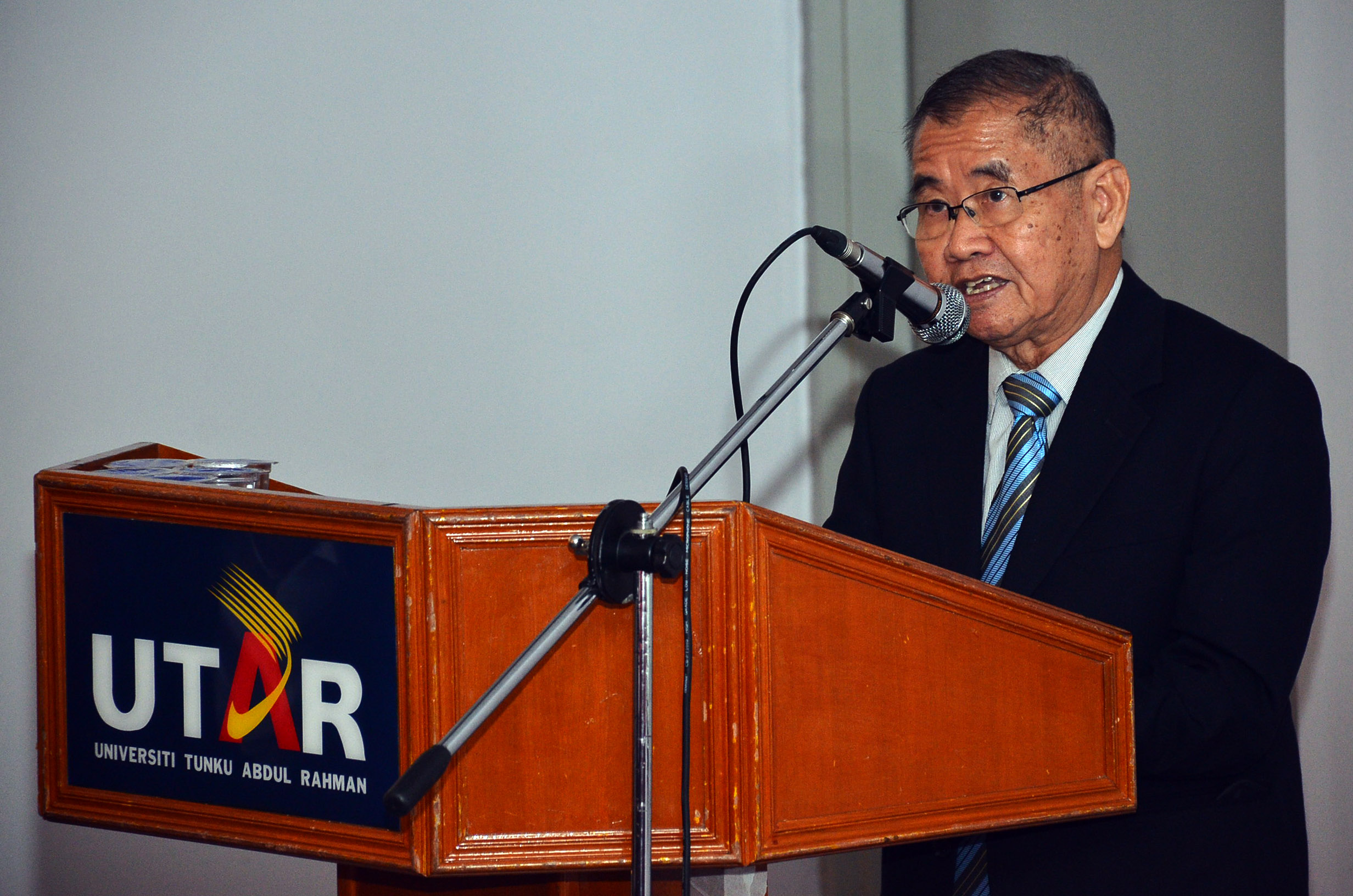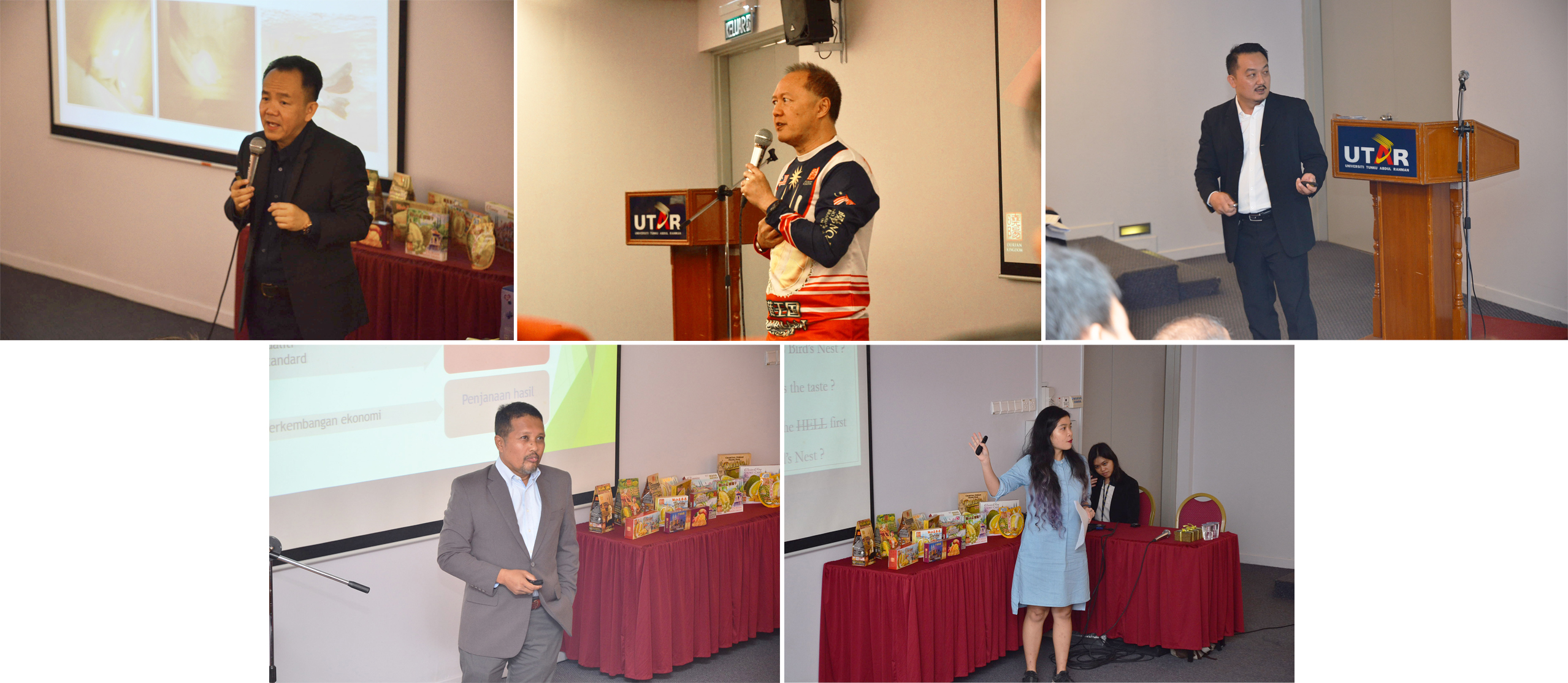
Food safety and hygiene processing for edible bird’s nest and durian
Dr Lim (front row, fifth from right) and speakers posing with participants
The one-day seminar on “Edible bird’s nest and Durian: From Farm to Table” was co-organised by UTAR Faculty of Science (FSc), UTAR Unovate Center and Majlis Daerah Kampar on 22 October 2019 at UTAR Kampar Campus.
Themed ‘Igniting Entrepreneurship, Transforming Business’, the seminar aimed to educate the public with knowledge on food safety and hygiene processing for edible bird’s nest and durian. The seminar was also an initiative under the “Community Project for Food Industries” project that was launched in 2017. The community project aimed to upgrade the food safety and hygiene standards of operation as well as to establish useful networks between the academics and food industries for the application of food safety and hygiene.
Present at the seminar were FSc Dean Assoc Prof Dr Lim Tuck Meng, Organising Chairperson Dr Tan Yen Nee, consultants for food companies Lam Ah Chye and Lai Mun Lee, staff and participants. The invited key speakers were President and Director of Inbit Corp (INBT) Dato’ Loke Yeu Loong, Founder & CEO of Sunshine Kingdom Sdn Bhd Aesos Lai, Founder of Mizhilian Musand King Pte. Ltd. Bruce Lee Sai Keong, Penolong Pegawai Kesihantan Persekitaran U36 of Jabatan Kesihatan Awam, Majlis Daerah Kampar Azhar bin Ahmad Bakri, and Co-founder of Nestrition Wellness Jazzelynn Tho.
Dr Tan delivering her speech
“The UTAR community project for food industries is a set of programmes prepared for small and cottage industries involved in food manufacturing businesses in Kampar and neighbouring areas to uplift food safety and hygiene standards. This seminar is one of the activities organised since the formation of the group back in 2016, and we had our first launch in 2017. In the year after, we successfully organised a two-day food safety awareness training, which focused on GMP, HACCP, Food Act and Regulations. Today, we are here again to educate the public with related information particularly on the production of downstream products of edible bird’s nest and durian,” said Dr Tan in her speech.

Lam delivering his speech
“We will continue to adopt and adapt, and to engage with the local food industries, thanks to UTAR’s hard work and perseverance, we are moving ahead. Kampar started as a tin-mining town, and the next major activity of the town was food. There were many traditional foods that have undergone many changes. It is now very difficult to find these foods with traditional taste. The food business is also undergoing changes, so it is about time, that the residence ignites the entrepreneurial spirit and adopt changes to transform business models using technology. I hope UTAR will continue playing the role of a game-changer to make Kampar a food paradise. Today, in this seminar, we are honoured to have three key players; they are UTAR, food industries, and Majlis Daerah Kampar,” said Lam.
First speaker Dato’ Loke enlightened participants with some background information on edible bird’s nest and its origin. With 400 years of history and commonly used in traditional Chinese medicine, Dato’ Loke mentioned that edible bird’s nest is one of the most expensive food, and is considered a great delicacy and beauty enhancer. He also shared that the factors driving the swiftlet nest industry as high impact industry were domestic and international market demand, scale of industry and integrated agriculture.
“However there are still challenges for edible bird’s nest export markets. These challenges include having some industrial players still focusing on raw edible bird’s nest; the market is limited to a certain market segment; price volatility in the export market; undetermined quality standards for raw products; and low value-added downstream products for commercialisation and export,” explained Dato’ Loke.
For downstream and distribution products, he explained that the current focus is placed on producing raw clean edible bird’s nest and raw unclean but edible, with the target market being in China, Hong Kong, and Taiwan. In improving the business’ competitiveness, the company’s future plans will look into producing pure edible bird’s nest extract in the form of powder and liquid. The extraction is made possible with the use of several technologies and methods, such as liquid-liquid extraction, solid-phase extraction, solid-phase microextraction, soxhlet extraction, and fizzy extraction.
Lai and Lee shared extensively on branding and business development strategies. With examples of their successful businesses, the speakers enlightened participants with important business strategies. For Lai, he spoke much about the importance of branding for a company, whereas Lee focused on setting core values for the company. Lee also added that collaboration with other businesses is one of the factors that ensures business expansion and success.
“A brand builds a business. It is likened to a good reputation that adds value, cultivate trust, and increase the visibility of the company. A strong brand is built based on a set of unique selling propositions. Customers today are emotional individuals, and many of their decisions are made based on how a brand makes them feel, more than the facts of it. So we must continue to be innovative and creative in our business to remain competitive. It is a continuous mission to explore new ways, to think boldly what no one has ever thought before, and to execute and reap the rewards of success,” explained Lai.
Azhar spoke on licensing and regulation on edible bird’s nest and durian products processing. He explained that the license is likened to the permission given by the relevant authorities for businesses to undertake certain economic activities. “It also acts as a control, whereby it ensures the safety of food, consumers and the environment. For the food industry, license is important to maintain a certain level of quality and standards for their products,” said Azhar. He later explained the procedures involved when applying for the license.
On the other hand, Tho said she was inspired by the boba milk tea trend; however, instead of using boba, the drinks and beverages served in her café contained edible bird’s nest. “Another reason to start this business using edible bird’s nest is because I want to help local business by using locally-produced goods, support the edible bird’s nest industry, reduce carbon footprint, and support the local communities. However, my bigger goals are to rebrand the image of edible bird’s nest consumption; challenge and break stereotypes on edible bird’s nest; educate public about many interesting ways to consume edible bird’s nest, and lastly, to drive local edible bird’s nest economy,” explained Tho. She also invited participants to visit her café which is located at Tin Alley, Ipoh.
Marking the end of the seminar was a closing speech by Dr Lim. “It is good to see the community working together to improve the situation and knowledge for the people. University is an institution that creates, preserves and disseminates knowledge. With the knowledge created, we believe that if we shared it to more people, those who have received the knowledge is able to make use of the knowledge. In UTAR, we have many community projects, particularly with the Chinese New Villages. These villages are very unique and have attracted many international students to visit and study these villages. They have also helped the villagers to set up an online business platform to market their product. We hope that in future, we will do more community projects that will benefit both the university and the community. Therefore, we are very grateful for the information we received today,” said Dr Lim in his speech.
He added, “For students who are looking forward to this kind of activity that is very much relevant to your studies, do note that the syllabus will give you fundamental knowledge, the industry will give you the applied knowledge, and combined you are able to be more competent and marketable to the industry. We are also very fortunate to receive much support from these organisations and sponsors to make this activity beneficial to the participants.”

Clockwise from top left: Esteemed speakers of the seminar Dato’ Loke, Lai, Lee, Tho, and Azhar
Dr Lim delivering his closing speech
© 2019 UNIVERSITI TUNKU ABDUL RAHMAN DU012(A).
Wholly owned by UTAR Education Foundation Co. No. 578227-M LEGAL STATEMENT TERM OF USAGE PRIVACY NOTICE